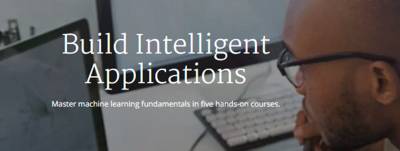| Coursera's Machine Learning Specialization |
| Written by Sue Gee | |||
| Monday, 30 November 2015 | |||
|
The first course in Coursera's Machine Learning Specialization starts next week on December 7th, 2015. Meanwhile the second course, Regression, opens today, November 30th.
Given that it was Andrew Ng's Machine Learning class that was the testing ground for Coursera, the MOOC platform he founded it is only fitting that Machine Learning should be among the topics for which you you can earn a Coursera Specialization certificate. Although Ng's highly popular course is still in the Coursera catalog, and a new session of it runs from November 30, 2105 to February 22, it isn't part of the Machine Learning Specialization which comes instead from the University of Washington and is taught by Emily Fox and Carlos Guestrin, both of whom have the title Amazon Professor of Machine Learning. According to its description: This Specialization provides a case-based introduction to the exciting, high-demand field of machine learning. You’ll learn to analyze large and complex datasets, build applications that can make predictions from data, and create systems that adapt and improve over time. In the final Capstone Project, you’ll apply your skills to solve an original, real-world problem through implementation of machine learning algorithms. At intermediate level, meaning you need to have a background in Python and in statistics, it comprises five courses and a Capstone project that consolidates the learning that has gone before.
Students intent on earning the certificate awarded on successful completion of this Specialization are advised to take its five courses in order. However there is some flexibility and, as the courses appear again regularly in the schedule, if you don't finish in one session you can re-enroll and carry on from where you got to, However, to obtain credit towards specialization you pay for each course at $79 per course, saving 10% if you pay for all of them up front. If you don't want certification you can follow the constituent courses for free. The first course, Machine Learning Foundations: A Case Study Approach, which runs from December 7 for 6 weeks, sets the scene for what is to follow in that it gives participants hands-on experience with machine learning from a series of practical case-studies. It description states: This first course treats the machine learning method as a black box. Using this abstraction, you will focus on understanding tasks of interest, matching these tasks to machine learning tools, and assessing the quality of the output. In subsequent courses, you will delve into the components of this black box by examining models and algorithms. Together, these pieces form the machine learning pipeline, which you will use in developing intelligent applications. The next course in the schedule is on Regression and a presentation of this course starts on November 30. The case study for this is predicting house prices and in the course, students explore regularized linear regression models for the task of prediction and feature selection. The next two modules are on Classification, with a case study in analysing sentiment and Clustering & Retrieval, with a case study in finding similar documents. The final course in the series, Recommender Systems & Dimensionality Reduction, students explore the task of recommending products based on customer reviews. Then for the Machine Learning Capstone: An Intelligent Application with Deep Learning they are expected to implement a deep learning model in Python for image-based product recommendation and deploy it as a service. It seems entirely fitting that having been taught by Amazon professors the final achievement should be to realize an Amazon-like product recommender! Machine learning is a big topic and one that is currently very much in vogue. Anyone interested in learning about it is going to find themselves spoilt for choice. Earlier this month we covered Udacity's Machine Learning Engineer Nanodegree, which covers a lot of the same topics but with a Google flavor. A search for Machine Learning on Class Central produces other options including a Kadenze course on Machine Learning for Musicians and Artists, Machine Learning for Trading from Udacity, and, also from Udacity courses on Supervised and Unsupervised Learning. Also on the list is Machine Learning With Big Data from Coursera, part of its Big Data Specialization from UC San Diego.
More InformationCoursera Machine Learning Specialization Related ArticlesCoursera Offers CS Specialization Certificates More Machine Learning From Udacity Coursera's Machine Learning Course Runs Again Hidden Benefits of Online Machine Learning
To be informed about new articles on I Programmer, sign up for our weekly newsletter, subscribe to the RSS feed and follow us on Twitter, Facebook or Linkedin.
Comments
or email your comment to: comments@i-programmer.info
|
|||
| Last Updated ( Tuesday, 08 September 2020 ) |




